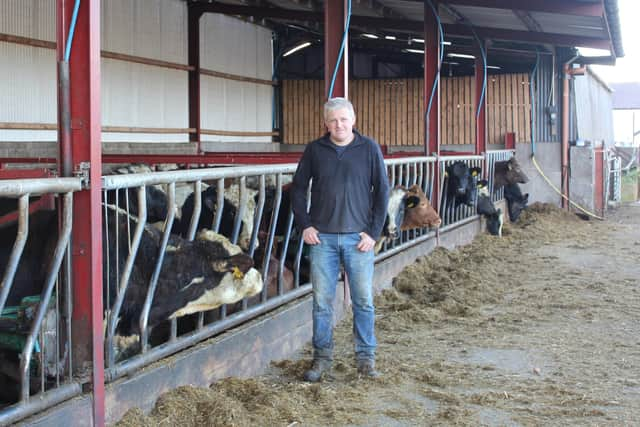Improving farm efficiency through membership of the local BDGs
and live on Freeview channel 276
Former Loughry Campus student, James, farms a mix of owned and conacre land extending to 225 acres. A total of 58 acres are set aside for arable and the remaining supports the calf to beef finishing enterprise with 300 head of cattle. James buys in predominantly dairy cross dropped calves at three weeks of age with a mix of Angus, Hereford and Limousin. Running a mix of heifers and bullocks, he aims to finish them at around 24 months of age.
After a spell working in the haulage industry, James returned home 20 years ago looking to improve the home farm. He changed from growing predominantly potatoes towards barley and wheat and increased the number of cattle being finished each year.
Advertisement
Advertisement
Then six years ago James joined his local CAFRE beef finishing BDG which is led by Facilitator Adam Jones. The group meets six times a year for training events. Through attending the group meetings James has made significant changes to his business, improving daily live weight gains (DLWG), reducing costs and improving cattle health. He has introduced a rotational grazing system to improve utilisation and grass growth. This has led to a significant reduction in concentrate use and improved DLWG at grass.


James also invested in a set of digital weigh scales which link up with his own farm management software. This enables him to calculate DLWG and evaluate the performance of the cattle.
BDGs have also highlighted the need for regular soil and silage analysis. James soil samples at least 25% of his ground every year and says this has helped him to get better results from the fertiliser he uses. It is also planned to stitch red clover into silage swards from next year to reduce the amount of fertiliser used further and improve silage protein levels.
James has taken advantage of the financial benchmarking available to members of the group. He uses benchmarking to see how he compares to other farms and to monitor how the management changes he has made are affecting his profitability.
Advertisement
Advertisement
James could see how membership of the beef finishing group was having a positive impact on his business so two years ago he decided to join his local arable BDG led by Iain Johnston, CAFRE Crops Adviser. One of his first investments after joining this group was to purchase a simple GPS system. This allowed him to better target and so reduce fertiliser use on both his arable crops and grassland. Visiting other BDG member’s farms and Technology Demonstration Farms (TDF) has allowed James to see at first-hand the difference technology can make to a similar business. James adds: “I purchased the simple GPS system for around £1300 a few years ago and it has definitely paid for itself. It’s a simple and effective way to target fertiliser use which is saving me time and money.”


James is also planning to trial growing some winter beans to see how he can reduce his reliance on imported protein. He is currently mixing his own rations from bought in straits, which saves around £40/tonne compared to buying in blend form.
This winter James has trialled treating his barley with Alkagrain with good results. Analysis has showed that the treated barley has a 15% protein level, feed intakes are up, and James is hoping that an increase in DLWG and a decrease in meal cost should improve the businesses profitability further.
The BDG scheme is funded by the Department of Agriculture, Environment and Rural Affairs and the European Agriculture Fund for Rural Development.